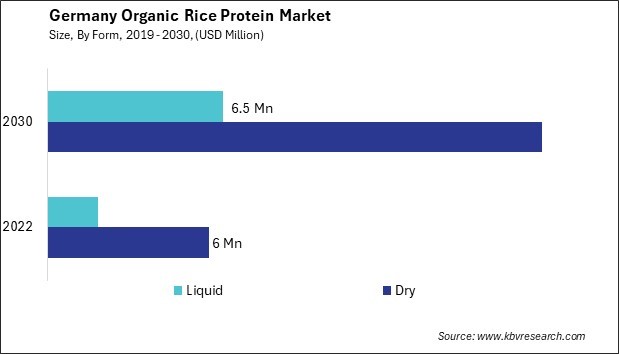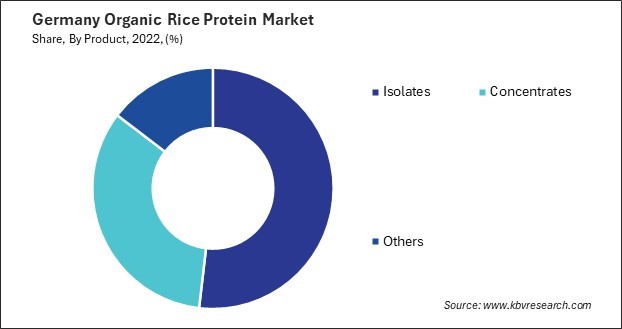Int'l : +1(646) 832-2886 | query@kbvresearch.com
Int'l : +1(646) 832-2886 | query@kbvresearch.com
Published Date : 15-May-2024 |
Pages: 52 |
Formats: PDF |
The Germany Organic Rice Protein Market size is expected to reach $24.8 Million by 2030, rising at a market growth of 15.6% CAGR during the forecast period. In the year 2022, the market attained a volume of 521.21 Tonnes, experiencing a growth of 12.6% (2019-2022).
The organic rice protein market in Germany has experienced significant growth in recent years, driven by increasing consumer awareness of health and sustainability. One of the primary factors contributing to the growth of the organic rice protein market in Germany is the rising demand for plant-based protein alternatives. As more consumers adopt vegetarian and vegan lifestyles, there is a growing need for high-quality plant-based protein sources.

Health-conscious consumers in Germany increasingly seek clean-label and minimally processed products, making organic rice protein an attractive option. In addition to its nutritional benefits, the organic rice protein market in Germany is influenced by the country's stringent organic certification standards. German consumers place a high value on certifications such as "Bio" (organic), ensuring that products meet strict criteria for using pesticides, synthetic fertilizers, and genetic engineering.
The agricultural landscape in Germany also contributes to the growth of the organic rice protein market. The country's commitment to sustainable and organic farming practices aligns with producing organic rice protein. German consumers, increasingly mindful of the environmental impact of their food choices, prefer products that support sustainable and eco-friendly practices throughout the supply chain.
During COVID-19 pandemic, the organic rice protein market in Germany faced both challenges and opportunities. The pandemic led to disruptions in the supply chain, affecting the production and distribution of organic products. However, the increased focus on health and wellness during the pandemic has also driven German consumers to seek out nutritious and immune-boosting food options.
In Germany, the organic rice protein market is experiencing a notable surge in demand, primarily driven by the growing preference for dairy alternatives. German consumers are increasingly adopting plant-based diets, motivated by health consciousness, environmental concerns, and ethical considerations. There is a rising awareness of lactose intolerance and dairy allergies, prompting German consumers to seek alternative protein sources that do not compromise their digestive health. Additionally, the perception of plant-based diets as a sustainable and environmentally friendly choice aligns with the eco-conscious mindset prevalent in Germany.
One of the key drivers behind the rising demand for rice protein-based milk in Germany is the growing awareness of lactose intolerance and dairy allergies. Many consumers seek alternatives that provide a similar nutritional profile to traditional dairy milk without the associated digestive issues. Rice protein-based milk, being lactose-free and hypoallergenic, has emerged as a preferred choice for individuals with these dietary concerns.
According to Germany Trade & Invest, while Germany holds the position of Europe's leading dairy producer, boasting a substantial milk production volume of 31.8 million tons in 2020 and securing the fourth position globally, it is noteworthy that the country's dairy industry stands as the second largest within its food and beverage sector with a total production value of approximately EUR 27.2 billion. In a parallel context, the organic rice protein market in Germany is gaining prominence, reflecting a growing trend towards organic and plant-based alternatives within the country's food industry. The significance of the German dairy industry aligns with its standing as a key player in the broader food and beverage landscape, mirroring the diverse choices consumers are making, including a shift towards plant-based protein sources like organic rice protein.
Organic rice protein market manufacturers are responding to this demand by introducing innovative dairy alternative products in Germany. These offerings cater to diverse dietary needs and preferences, ranging from protein-enriched plant-based beverages to dairy-free protein powders. Thus, the surge in demand for organic rice protein in Germany is driven by a growing preference for dairy alternatives, fueled by health consciousness and environmental concerns.
In Germany, the organic rice protein market has witnessed a notable surge in popularity, with a significant contributing factor being the rising prominence of rice protein concentrate. Consumers in Germany are increasingly seeking sustainable and ethically sourced protein options, and rice protein concentrate has emerged as a frontrunner in meeting these preferences. One key factor driving its popularity is its organic nature, aligning with the country's strong emphasis on organic and eco-friendly products.
Moreover, the rise of the fitness and wellness culture in Germany has propelled the demand for protein-rich supplements, with rice protein concentrate recognized for its effectiveness in muscle recovery and overall health support. The versatility of rice protein concentrate in various applications, including shakes, bars, and baked goods, has further contributed to its widespread adoption in Germany. German consumers are also increasingly scrutinizing product labels, seeking transparency in ingredient sourcing and processing methods. The clean and minimal processing of rice protein concentrate aligns with these preferences, bolstering its appeal among health-conscious individuals.
The nutritional profile of rice protein concentrate also contributes to its success in the German industry. Rich in essential amino acids, hypoallergenic, and easily digestible, it appeals to health-conscious German consumers seeking plant-based protein options without compromising nutritional value. Hence, the surge in Germany's organic rice protein market, driven by the popularity of rice protein concentrate, is attributed to its organic nature, alignment with sustainability trends, versatility in applications, and favorable nutritional profile.

The organic rice protein market in Germany has witnessed significant growth as consumers increasingly prioritize sustainable and plant-based dietary choices. One notable German organic rice protein market participant is Herbaria Kräuterparadies GmbH. Specializing in organic herbs and spices, Herbaria has expanded its product offerings to include organic rice protein. The company's commitment to organic farming practices aligns with the preferences of German consumers who value environmentally friendly and ethically sourced products.
Another significant contributor is Veganz, a German company that provides plant-based products. Veganz has recognized the increasing demand for organic protein alternatives and offers a variety of plant-based products, including organic rice protein. The company's emphasis on sustainability and a vegan lifestyle resonates well with German consumers, who increasingly adopt plant-centric diets for health and ethical reasons.
EcoFinia GmbH, the parent company of Davert GmbH, is actively involved in the German organic rice protein market. The brand specializes in organic and fair-trade products, and through its subsidiary Davert, it has introduced organic rice protein to its diverse range of offerings. The company's focus on fair trade practices and high-quality organic ingredients aligns with the values of German consumers who seek transparency and ethical sourcing in their food choices.
German-based VITARO Nutritional GmbH has also made significant strides in the organic rice protein sector. The company develops and produces innovative nutritional ingredients, including organic rice protein. VITARO's commitment to research and development ensures that its products meet the high standards of quality and nutritional value expected by German consumers who prioritize health and well-being.
A key player in the German organic rice protein market, Rapunzel Naturkost GmbH, has extended its product line to include organic rice protein. Rapunzel strongly emphasizes organic farming, fair trade, and sustainability. The company's dedication to offering wholesome and organic products resonates with the German consumer's preference for foods that align with ethical and ecological values.
Germany's organic food brand, Alnatura, has also ventured into the organic rice protein market. Alnatura is known for its wide range of organic products, and its entry into the organic protein sector reflects the brand's adaptability to evolving consumer preferences. The company's focus on organic agriculture and environmentally friendly practices aligns with the sustainability concerns of German consumers. Companies operating in this space play a pivotal role in shaping the landscape of the German organic food industry by offering diverse and sustainable protein options.
By Form
By Product
By Application